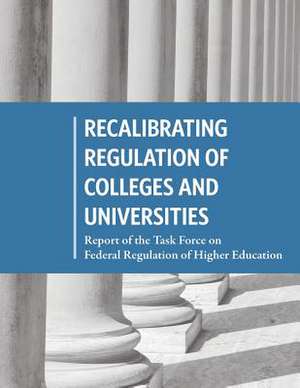Recalibrating Regulation of Colleges and Universities
Autor United States Governmenten Limba Engleză Paperback
Preț: 90.78 lei
Nou
Puncte Express: 136
Preț estimativ în valută:
17.37€ • 18.11$ • 14.44£
17.37€ • 18.11$ • 14.44£
Carte disponibilă
Livrare economică 27 februarie-13 martie
Preluare comenzi: 021 569.72.76
Specificații
ISBN-13: 9781508766803
ISBN-10: 1508766800
Pagini: 126
Dimensiuni: 216 x 279 x 7 mm
Greutate: 0.31 kg
Editura: CREATESPACE
ISBN-10: 1508766800
Pagini: 126
Dimensiuni: 216 x 279 x 7 mm
Greutate: 0.31 kg
Editura: CREATESPACE
